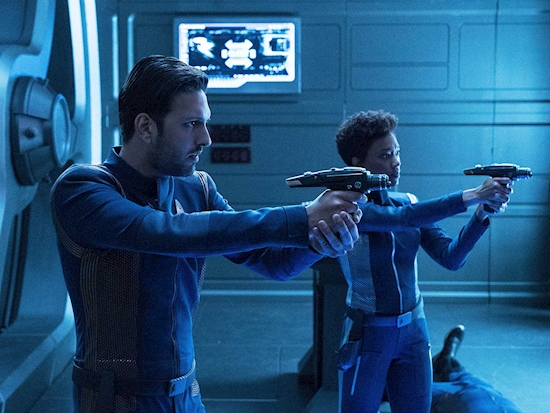What's with All the Hate for 'Star Trek: Discovery'?
Star Trek fans have been waiting over a decade for a new Star Trek TV show, so many fans were excited when Star Trek: Discovery finally aired back in September. But since its launch the show seems to have been met with an usually high degree of hostility from viewers, who have questioned everything from its uniforms to its ship designs. Writer Sara Lynn Michener thinks those concerns are overblown.
“When a show tries too hard to adhere to canon, it doesn’t have as much flexibility for creativity,” Michener says in Episode 285 of the Geek’s Guide to the Galaxy podcast. “Even the idea that some people are suggesting that they should build an entire ship based on outdated technology is just nuts. It’s just crazy.”
Podcast
Another point of contention is that the show is available exclusively through CBS All Access, a new monthly streaming service. Many fans have revolted at the prospect of having to sign up for yet another service just to watch Star Trek, but Michener says she welcomes the opportunity to support the show and watch it ad-free. “People should be bending over backward to pay money for good science fiction,” she says. “Because it deserves it, it’s worth it.”
Discovery also features the first openly gay characters to appear on a Star Trek TV show—the ship’s doctor, Hugh Culber (Wilson Cruz), and his partner, science officer Paul Stamets (Anthony Rapp). This has proven to be yet another source of controversy, with some viewers declaring that they refuse to watch a show about gay characters. It’s a stance that science fiction editor John Joseph Adams finds particularly bizarre coming from Star Trek fans. “How do you reconcile everything else that’s in Star Trek with hating somebody else because they’re different?” he says. “It just doesn’t compute.”
Science fiction author Anthony Ha agrees, noting that Star Trek has always had a political agenda. He says it was odd to see people complaining about the Discovery actors ‘politicizing’ Star Trek by expressing solidarity with protesting NFL players.
“Look, if you disagree with that—well, you’re wrong there too, but at least that’s a position you can take,” he says. “But if you’re saying ‘Star Trek should not be political,’ that is a completely invalid and dumb position.”
Listen to the complete interview with Sara Lynn Michener, John Joseph Adams, and Anthony Ha in Episode 285 of Geek’s Guide to the Galaxy (above). And check out some highlights from the discussion below.
Anthony Ha on Klingons:
“The Klingon scenes are definitely my least favorite part of the show. The make-up I think looks cool, but it’s hard to get a great sense of their expression, and all the Klingons look kind of similar, so it can be hard to tell which Klingon is talking in which moment, which I think is why they had to introduce scars and make-up and things like that. So I think it’s hard to tell the difference between some of the Klingons, and then when they speak they speak in this monotone that doesn’t really register as dialogue—it just feels like everyone’s kind of declaiming this speech that doesn’t really convey any meaning or emotion, and so I really did not enjoy those scenes.”
Anthony Ha on Starfleet:
“I think it’s a balance that Star Trek has always had to strike of wanting to have somewhat idealized versions of these characters but at the same time not leeching all drama and believability from it, and obviously this show veers more toward the kind of fallible, human characters. If I think about a show like Next Generation, the crew members of the Enterprise are all genuinely good people, but there’s not necessarily a sense that all of Starfleet is this enlightened. A lot of storylines revolve around Picard having to deal with other captains or other admirals who are doing shady things. So it felt different, for sure. … But it didn’t feel like it was totally breaking the rules of what Star Trek has done before.”
Sara Lynn Michener on Trek creator Gene Roddenberry’s vision:
“It would bother me if Star Trek started to have the kinds of dramatic tension that are known tropes in our universe, so for instance, ‘two women arguing about a man,’ that kind of thing. If that happened on Star Trek, I would just weep, I would be so sad. I think Roddenberry’s vision was not necessarily saying that humanity had ‘evolved’ to embrace these beliefs, but that humanity had embraced a different culture—that there was nothing biological about this change. To me that’s even scarier because it means it can be revoked at any time, it means that it can be established more or less on certain ships under the direction of different captains. It’s just social order, and that’s very fragile.”
John Joseph Adams on ranking Star Trek: Discovery:
“One of the commenters brought up a good point—which I agree with—that although I don’t love the show 100 percent, if you compare it to the first season of other Star Trek shows, then yeah, it’s really, really good in comparison, because most of the other first seasons of Star Trek shows haven’t been great. There are always a few episodes that are really great—I mean, the first episode of Deep Space Nine is phenomenal. It’s a two-hour pilot and it’s one of the best examples of movie-length science fiction that I’ve ever seen. And so that’s great, but then overall the first season is pretty good but not fantastic. So if you compare Discovery to any of those, it actually holds up really well.”
Go Back to Top. Skip To: Start of Article.Source: www.wired.com

